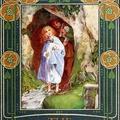CHAPTER 6, part 3
'Do be quiet,' cried the nurse, in a whispered shriek. But the boy, who was now close at hand, still went on.
'Hush! scush! scurry!
There you go in a hurry!
Gobble! gobble! goblin!
There you go a wobblin'; Hobble, hobble, hobblin'-- Cobble! cobble! cobblin'! Hob-bob-goblin!--
Huuuuuh!' 'There!' said the boy, as he stood still opposite them. 'There! that'll do for them. They can't bear singing, and they can't stand that song. They can't sing themselves, for they have no more voice than a crow; and they don't like other people to sing.' The boy was dressed in a miner's dress, with a curious cap on his head. He was a very nice-looking boy, with eyes as dark as the mines in which he worked and as sparkling as the crystals in their rocks. He was about twelve years old. His face was almost too pale for beauty, which came of his being so little in the open air and the sunlight--for even vegetables grown in the dark are white; but he looked happy, merry indeed--perhaps at the thought of having routed the goblins; and his bearing as he stood before them had nothing clownish or rude about it.
'I saw them,' he went on, 'as I came up; and I'm very glad I did. I knew they were after somebody, but I couldn't see who it was. They won't touch you so long as I'm with you.' 'Why, who are you?' asked the nurse, offended at the freedom with which he spoke to them.
'I'm Peter's son.' 'Who's Peter?' 'Peter the miner.' 'I don't know him.' 'I'm his son, though.' 'And why should the goblins mind you, pray?' 'Because I don't mind them. I'm used to them.' 'What difference does that make?' 'If you're not afraid of them, they're afraid of you. I'm not afraid of them. That's all. But it's all that's wanted--up here, that is. It's a different thing down there. They won't always mind that song even, down there. And if anyone sings it, they stand grinning at him awfully; and if he gets frightened, and misses a word, or says a wrong one, they--oh! don't they give it him!' 'What do they do to him?' asked Irene, with a trembling voice.
'Don't go frightening the princess,' said the nurse. 'The princess!' repeated the little miner, taking off his curious cap.
'I beg your pardon; but you oughtn't to be out so late. Everybody knows that's against the law.' 'Yes, indeed it is!' said the nurse, beginning to cry again. 'And I shall have to suffer for it.' 'What does that matter?' said the boy. 'It must be your fault. It is the princess who will suffer for it. I hope they didn't hear you call her the princess. If they did, they're sure to know her again: they're awfully sharp.' 'Lootie! Lootie!' cried the princess. 'Take me home.' 'Don't go on like that,' said the nurse to the boy, almost fiercely. 'How could I help it? I lost my way.' 'You shouldn't have been out so late. You wouldn't have lost your way if you hadn't been frightened,' said the boy. 'Come along. I'll soon set you right again. Shall I carry your little Highness?'

